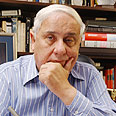
Everyone is right in the war that followed the Second Lebanon War. Those who believe it was an untimely and unsuccessful war that led to the erosion of our deterrent power, especially vis-à-vis Hezbollah, are right. Those who argue that the war led to absolute calm in the rocket-battered north, pushed Hezbollah’s men away from the border, and prompted the deployment of an international force in south Lebanon are also right.
Yet there are 160 Israeli soldiers and civilians who regardless of being right or wrong will never be able to speak up again. They are currently at their final resting place, at military and civilian cemeteries, and nobody asks for their opinion on that war. In any case, they won’t be able to answer.
The State of Israel fought six wars before the Second Lebanon War. We mark its third anniversary this month. We had bloody wars that were forced upon us – the War of Independence for example, or the Yom Kippur War. Other wars we initiated – the 1956 Sinai War, for example. The Six-Day War, for example (in response to the threatening deployment of Arab armies.) The Second Lebanon War was certainly initiated by us.
The sad Israeli experience teaches us that this is in fact one long war, which started in 1948 (and there are those who say it started even earlier) and which merely keeps on changing its name. And as this is one long war, we must avoid as much as possible unnecessary wars – that is, when the decision and power of initiative is in our hands.
Painful blow to our image
Such wars should be initiated only when we face a grave immediate threat. The Six-Day War, for example, and certainly the Yom Kippur War were wars of no choice. In such wars, by the way, we always win, even if we pay a heavy price, because a whole State is fighting for its life.
The sense here was completely different during the first Lebanon War in 1982 and during the Second Lebanon War, three years ago. In both these wars we did not feel a sense of no choice, or that we were facing a grave danger; that’s why in these wars the game was not worth the candle.
One can argue, and rightfully so, that the Second Lebanon War brought quiet to the north, yet behind this calm, Hezbollah prepares its men and its weapons for the next war.
During the war, which was not prepared properly, first and foremost by military officials, we sustained a serious blow to our image. On the battlefield, image comes with a price, and in this case it was a painful price.
Then-Prime Minister Ehud Olmert claims that the political leadership prepared the war well. This may be the case. Yet the image, that same cursed image, points to hastiness in the decision-making process. This is what has been etched in our consciousness, and no commissions of inquiry or a thousand books will change that.
Three years have passed. The pain felt by the bereaved families does not subside. This pain was compounded by the sense that this was an unsuccessful war, even though it resulted in some achievements. “A war that never has enough,” wrote the poet, “it is now elsewhere.” At this time, we are looking in Iran’s direction. Lebanon, for the time behind at least, is behind us.















